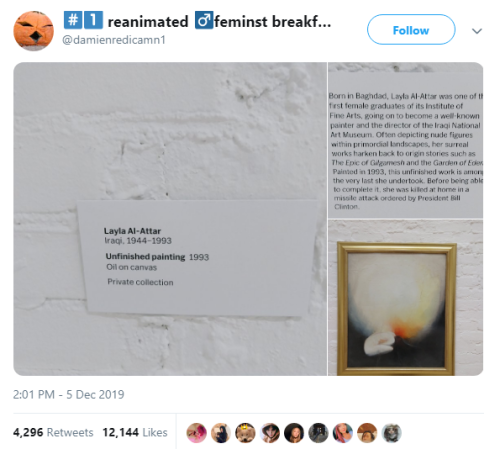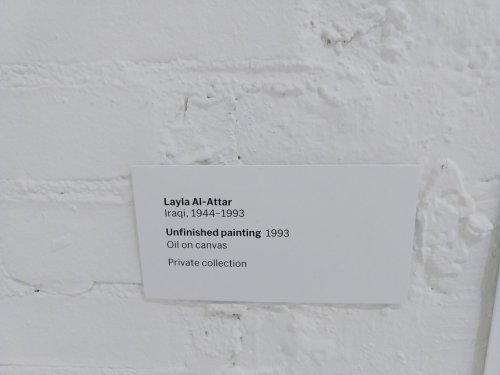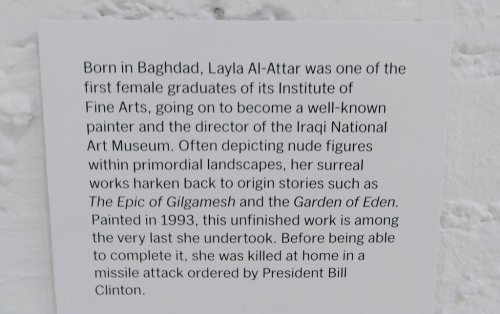ms-demeanor:proudheron:goawfma:this is really chillingstepping outside of the horror of this story f
ms-demeanor:proudheron:goawfma:this is really chillingstepping outside of the horror of this story for a moment, this exemplifies to me why didactics (explanatory text panels) are so important, even in the context of fine art. i’ve had so many arguments about this. folks insist that if a fine art piece can’t speak for itself, it’s not art, or shouldn’t be on display. but in a case like this, where american imperialism has destroyed this artist’s voice, i feel that the curator must tell her story. I feel like this is somewhat dangerously decontextualized.Layla Al-Attar’s death was a tragedy. She and her housekeeper and her husband should not have been killed. Her daughter should not have been blinded. But this makes it sound like Al-Attar was personally targeted.Al-Attar’s home was near the headquarters of the Iraqi Intelligence Service, which was fired on by US Cruise Missiles after the IIS had been connected to a car-bombing plot to assassinate George HW Bush and the Kuwaiti prime minister.What happened here is basically:A former US President and Kuwaiti head of State met to commemorate the end of the Gulf War (a conflict started by the Iraqi invasion of Kuwait).The Iraqi Intelligence Service attempted to car-bomb this meeting.The US bombed the IIS in retaliation. The IIS had been connected to many, MANY human rights violations in addition to various assassination attempts; most notably the IIS was in charge of the Iraqi chemical weapons program that repeatedly used chemical weapons against civilian populations. (I point this out because we would consider bombing the Pentagon to be a very different sort of act than bombing the Smithsonian)Was the US in violation of international law in this bombing? Yes.Were civilians needlessly killed? Yes. Aside from Layla Al-Attar’s household there were six other civilians killed and more injured.Do I still think Bill Clinton is a war criminal? YES.Do I agree with US imperialism? No.Is this a simple case of blood-for-oil profiteering on the part of the US? Also no. It’s possible to frame Al-Attar’s death as the intentional result of American imperialism. It’s possible to describe Al-Attar as collateral damage to Saddam Hussein’s attempt to annex Kuwait. I don’t want to defend the US’s actions here. I think that firing bombs at things is bad and firing bombs *badly* and missing your targets to hit unintended targets is worse. I think Clinton was wrong to do order this missile strike. But I also think it’s wrong to divorce this bombing from the context of sarin gas used on Kurdish civilians and assassination attempts coordinated under the leadership of a man who held power with party purges and executions in order to frame this death as the result of American empire-building. You know how we talk about the rehabilitation of George W. Bush and Ronald Regan and how people are even now talking about the way that Trump will be viewed as a hero or at least a harmless joke after his presidency?The erasure of the conflict around Al-Attar’s death and the exclusive focus on the US and Bill Clinton is the way that you start to see the rehabilitation of Saddam Hussein. The death of civilians in a conflict that they have no part of is an uncomplicated tragedy. Every civilian death in any military conflict is an avoidable tragedy and a reason to call for an end to military conflicts. But almost every military/international conflict is a complicated piece of history and while I understand the temptation to paint the US as the bad guys and Bill Clinton as the lone instigator of this event to do so is to ignore the reason that deaths like Al-Attar’s happen. -- source link
Tumblr Blog : goawfma.tumblr.com
#ms demeanor#layla al-attar#history#long post#bill clinton#saddam hussein#us imperialism#informative reblogs




